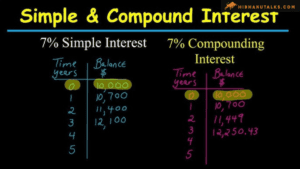
Avoid These Costly Mistakes in Stock Trading—A Must-Read Guide for Every Investor
Contents
- 1 Trading Mistakes
- 1.1 Avoid These Costly Mistakes in Stock Trading—A Must-Read Guide for Every Investor
- 1.1.1 1. Lack of a Trading Plan
- 1.1.2 2. Overtrading
- 1.1.3 3. Ignoring Risk Management
- 1.1.4 4. Letting Emotions Drive Decisions
- 1.1.5 5. Neglecting Research and Analysis
- 1.1.6 6. Chasing Losses
- 1.1.7 7. Overleveraging
- 1.1.8 8. Failing to Adapt to Market Conditions
- 1.1.9 9. Ignoring Long-Term Trends
- 1.1.10 10. Failure to Review and Learn from Trades
- 1.1.11 Conclusion
- 1.1.12 Frequently Asked Questions (FAQs)
- 1.1.12.1 1.What is the importance of having a trading plan?
- 1.1.12.2 2.How can overtrading affect my trading performance?
- 1.1.12.3 3.What is risk management in stock trading?
- 1.1.12.4 4.How can emotions impact trading decisions?
- 1.1.12.5 5.What role does research and analysis play in trading?
- 1.1.12.6 6.Why should I avoid chasing losses?
- 1.1.12.7 7.What are the risks of overleveraging?
- 1.1.12.8 8.How can I adapt to changing market conditions?
- 1.1.12.9 9.Why is it important to consider long-term trends in trading?
- 1.1.12.10 10.How can reviewing past trades improve my trading skills?
- 1.2 Trading Mistakes
- 1.3 Master the Market: Comprehensive Strategies Every Investor Needs to Know
- 1.1 Avoid These Costly Mistakes in Stock Trading—A Must-Read Guide for Every Investor
Trading Mistakes
Avoid These Costly Mistakes in Stock Trading—A Must-Read Guide for Every Investor
Stock trading can be both exhilarating and challenging. While the potential for substantial gains exists, so do risks and pitfalls. Many traders, whether novice or experienced, make common mistakes that can adversely affect their trading success. Understanding and avoiding these mistakes is crucial for improving trading performance and achieving long-term success. In this guide, we’ll explore some of the most frequent errors made in stock trading and provide actionable tips on how to avoid them.


1. Lack of a Trading Plan
Explanation:
One of the most significant mistakes in stock trading is trading without a well-defined plan. A trading plan outlines your goals, strategies, risk tolerance, and criteria for entering and exiting trades. Without a plan, traders often make impulsive decisions based on emotions rather than rational analysis.
How to Avoid:
- Create a Detailed Plan: Develop a trading plan that includes your objectives, strategies, risk management rules, and criteria for selecting stocks.
- Stick to the Plan: Follow your plan consistently and avoid deviating from it based on short-term market movements or emotions.


2. Overtrading
Explanation:
Overtrading occurs when traders buy and sell stocks too frequently, often driven by the desire to chase profits or react to every market movement. This can lead to excessive transaction costs and reduced overall returns.
How to Avoid:
- Set Clear Criteria: Define specific criteria for entering and exiting trades and stick to them.
- Be Patient: Focus on high-quality trades rather than trying to capitalize on every market opportunity.
3. Ignoring Risk Management
Explanation:
Risk management is crucial in stock trading, yet many traders neglect it. Ignoring risk management can lead to significant losses and jeopardize your trading capital.
How to Avoid:
- Use Stop-Loss Orders: Set stop-loss orders to limit potential losses on each trade.
- Diversify Your Portfolio: Avoid putting all your capital into a single stock or sector. Diversification helps spread risk and reduce the impact of individual stock movements.
- Determine Position Sizes: Calculate appropriate position sizes based on your risk tolerance and the size of your trading account.


4. Letting Emotions Drive Decisions
Explanation:
Emotional trading is a common mistake where traders let fear, greed, or excitement dictate their decisions. This can result in impulsive actions and poor trading choices.
How to Avoid:
- Stick to Your Plan: Rely on your trading plan and strategies rather than emotional reactions.
- Practice Mindfulness: Develop emotional discipline and recognize when emotions are influencing your decisions.
5. Neglecting Research and Analysis
Explanation:
Successful trading requires thorough research and analysis of stocks and market conditions. Neglecting this step can lead to uninformed decisions and missed opportunities.
How to Avoid:
- Conduct Thorough Research: Analyze company fundamentals, financial statements, and market trends before making trading decisions.
- Use Technical and Fundamental Analysis: Employ both technical and fundamental analysis to gain a comprehensive understanding of the stocks you’re trading.


6. Chasing Losses
Explanation:
Chasing losses occurs when traders make additional trades to recover from previous losses, often leading to even greater losses. This behavior is driven by the desire to “make up” for previous mistakes.
How to Avoid:
- Accept Losses: Recognize that losses are a part of trading and avoid the temptation to recover them immediately.
- Reevaluate Your Strategy: Analyze what went wrong and adjust your trading strategy if necessary.
7. Overleveraging
Explanation:
Overleveraging involves using borrowed funds to amplify potential returns, which also increases potential risks. While leverage can enhance gains, it can also magnify losses.
How to Avoid:
- Use Leverage Wisely: Only use leverage when you fully understand the risks and have a solid risk management plan.
- Limit Leverage Exposure: Avoid excessive leverage that could jeopardize your trading capital.


8. Failing to Adapt to Market Conditions
Explanation:
Markets are dynamic and constantly changing. Failing to adapt your trading strategies to evolving market conditions can lead to suboptimal results.
How to Avoid:
- Stay Informed: Keep up with market news, economic indicators, and changes in market conditions.
- Adapt Strategies: Be flexible and adjust your trading strategies based on current market trends and conditions.
9. Ignoring Long-Term Trends
Explanation:
Focusing solely on short-term price movements without considering long-term trends can result in missed opportunities and poor trading decisions.
How to Avoid:
- Analyze Long-Term Trends: Incorporate long-term trend analysis into your trading strategy to align with broader market movements.
- Balance Short-Term and Long-Term Goals: Ensure that your trading plan addresses both short-term and long-term investment objectives.


10. Failure to Review and Learn from Trades
Explanation:
Many traders fail to review their past trades and learn from their experiences. Trading Mistakes, Without a review process, it’s challenging to identify patterns, mistakes, and areas for improvement.
How to Avoid:
- Maintain a Trading Journal: Keep a detailed record of all your trades, including the rationale behind each decision, outcomes, and lessons learned.
- Regularly Review Performance: Periodically review your trading performance to identify strengths and weaknesses and refine your trading strategies.


Conclusion
Avoiding common mistakes in stock trading is essential for improving your trading skills and achieving long-term success. By creating a solid trading plan, managing risks effectively, avoiding emotional decisions, and staying informed, you can enhance your trading performance and build a more successful trading career. Trading Mistakes, Remember, trading is a continuous learning process, and staying disciplined and adaptable will help you navigate the complexities of the stock market with greater confidence.
Frequently Asked Questions (FAQs)
1.What is the importance of having a trading plan?
A. A trading plan helps you set clear goals, strategies, and risk management rules, guiding your trading decisions and reducing impulsive actions.
2.How can overtrading affect my trading performance?
A. Overtrading can lead to excessive transaction costs, reduced returns, and increased risk due to frequent buying and selling.
3.What is risk management in stock trading?
A. Risk management involves strategies to limit potential losses, such as using stop-loss orders, diversifying your portfolio, and determining appropriate position sizes.
4.How can emotions impact trading decisions?
A. Emotions like fear and greed can lead to impulsive decisions and poor trading choices, affecting overall performance.
5.What role does research and analysis play in trading?
A. Research and analysis provide critical insights into stocks and market conditions, helping you make informed trading decisions.
6.Why should I avoid chasing losses?
A. Chasing losses often leads to additional losses and can worsen your trading situation. It’s important to accept losses and reassess your strategy.
7.What are the risks of overleveraging?
A. Overleveraging can amplify both gains and losses, potentially leading to significant financial risk and jeopardizing your trading capital.
8.How can I adapt to changing market conditions?
A. Stay informed about market news and trends, and adjust your trading strategies based on current conditions to align with broader market movements.
9.Why is it important to consider long-term trends in trading?
A. Long-term trends provide context for short-term price movements and can help you make more informed trading decisions aligned with broader market directions.
10.How can reviewing past trades improve my trading skills?
A. Reviewing past trades helps you identify patterns, mistakes, and areas for improvement, allowing you to refine your strategies and enhance your trading performance.





















3 comments